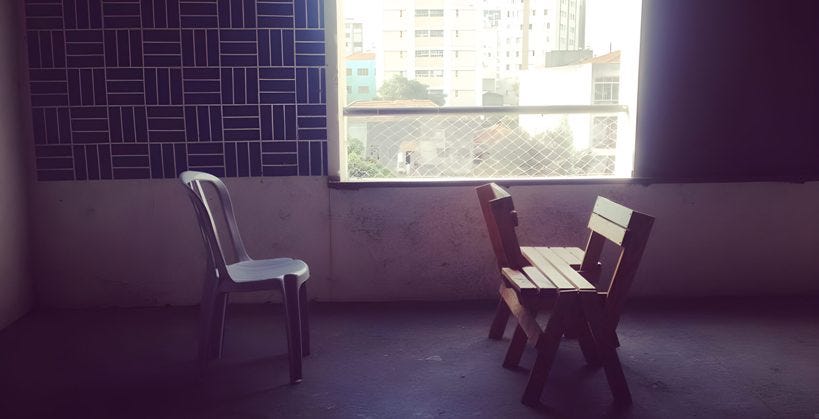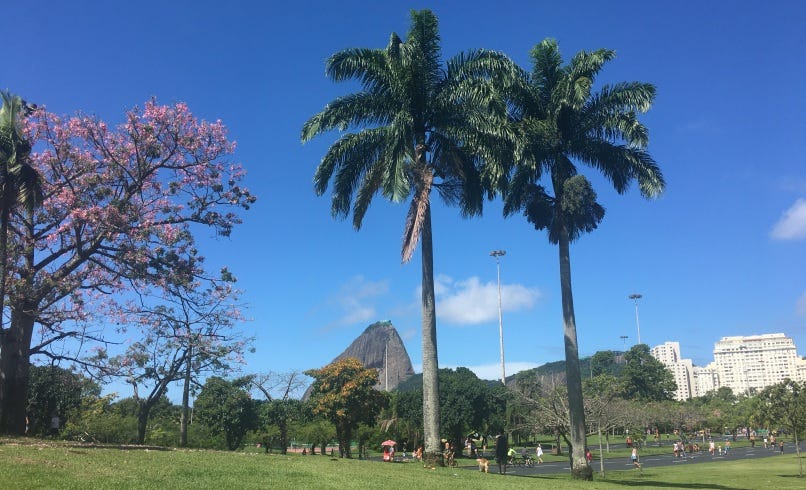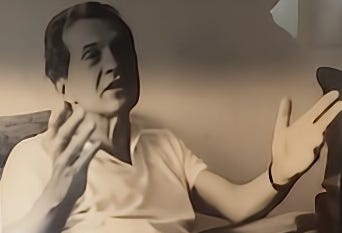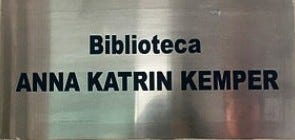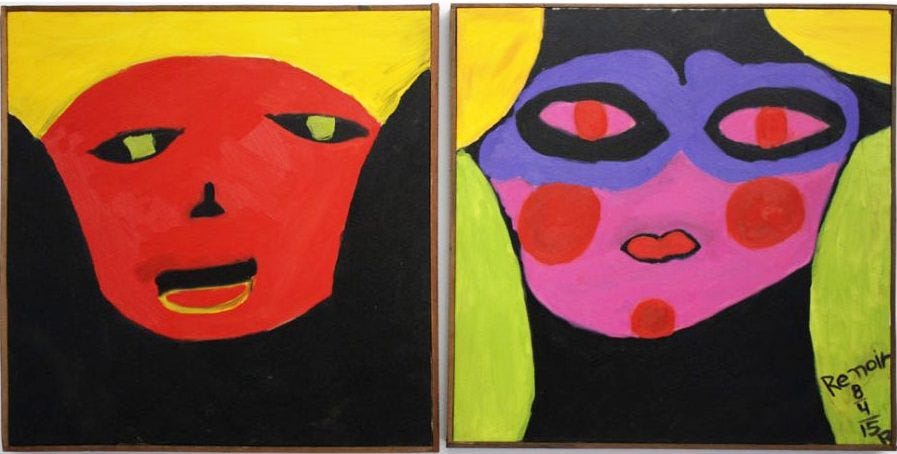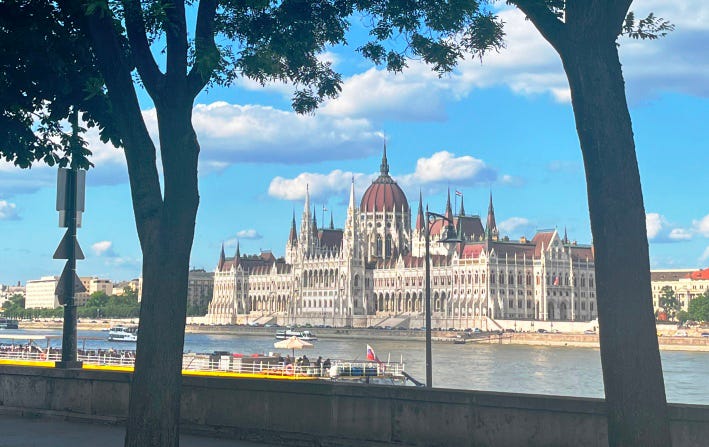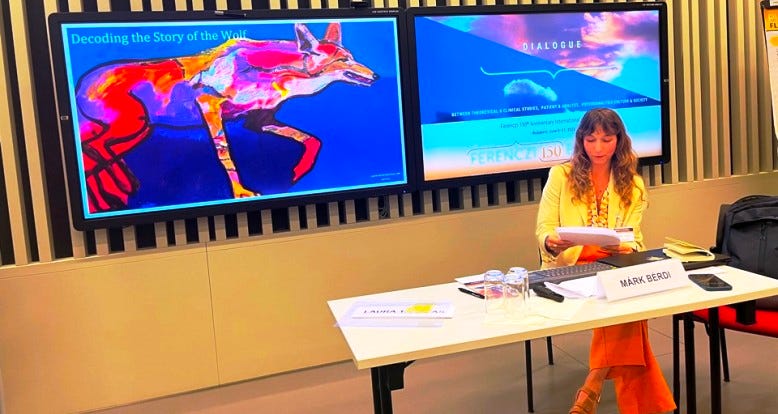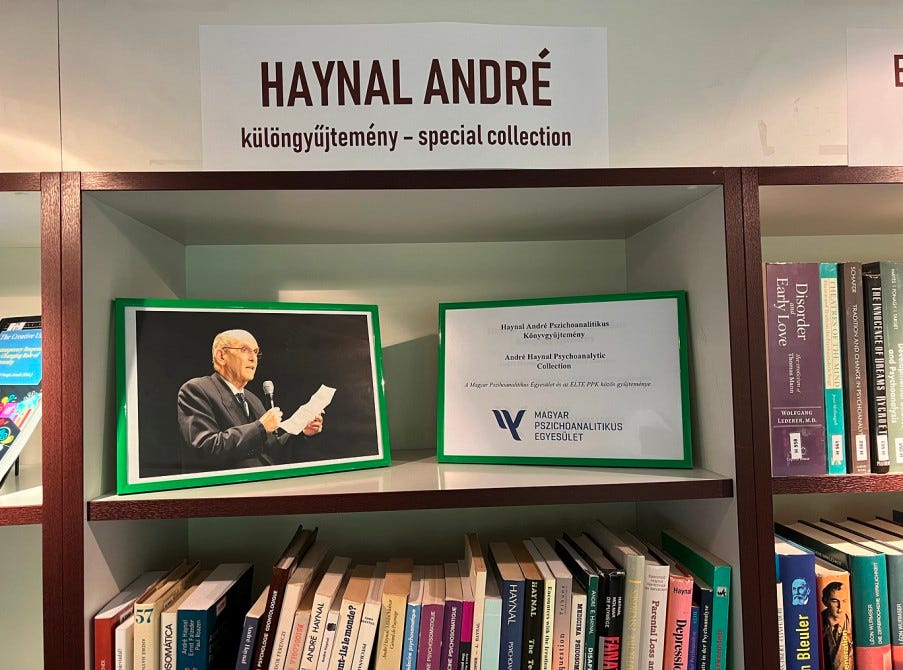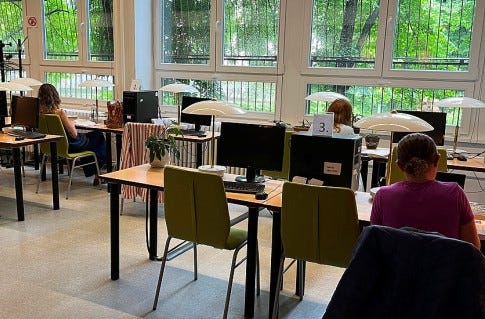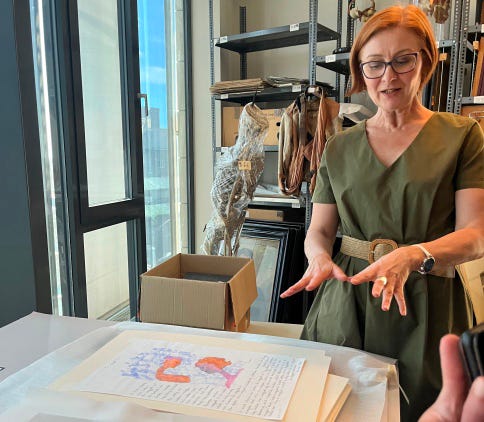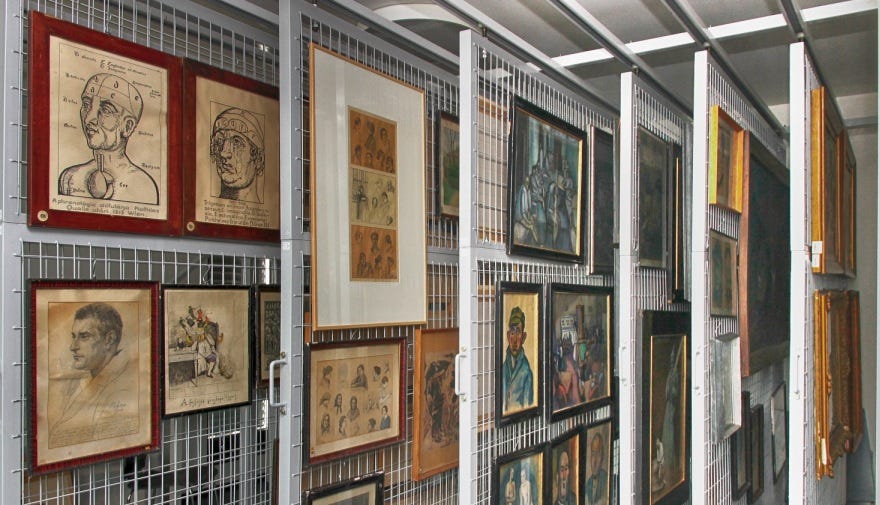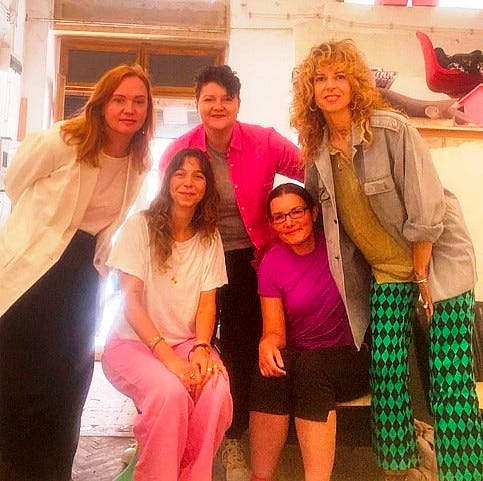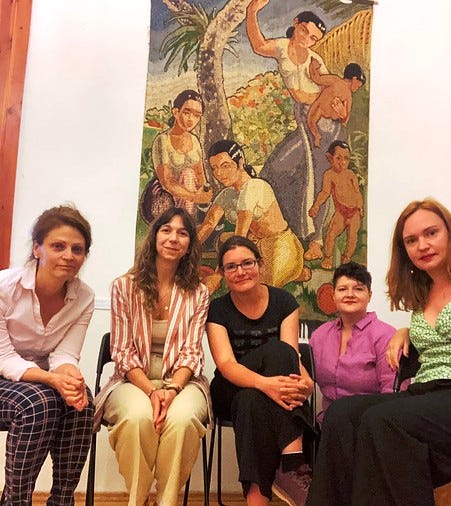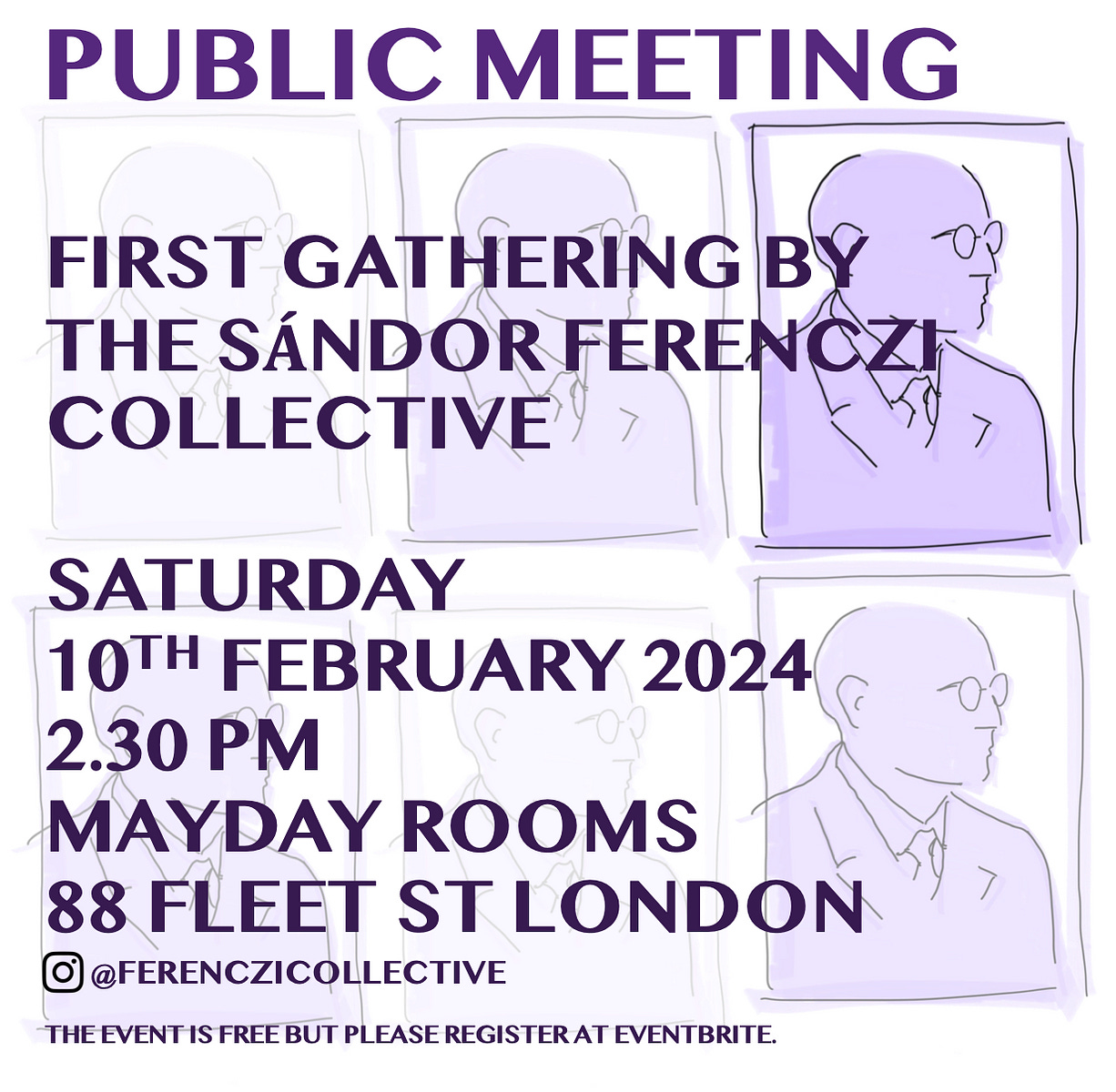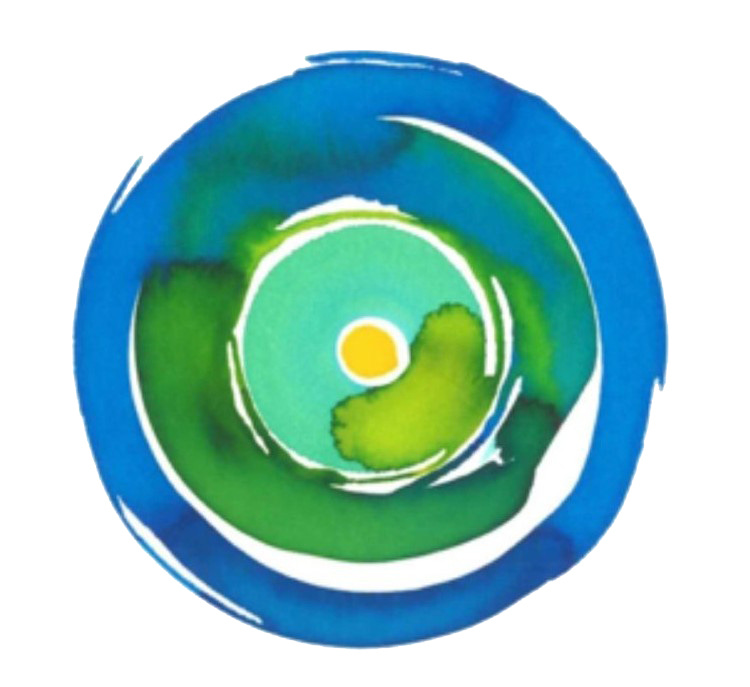FreePsy News no. 3 Fieldwork Issue
Welcome to the 3rd FREEPSY newsletter!
In 2023, the FREEPSY team travelled to Budapest and Rio de Janeiro for fieldwork. In Budapest, the team initiated archival research, visited relevant special collections, and established important links with scholars, psychoanalysts, activists and artists, in anticipation of further trips. In Rio de Janeiro, the team initiated ethnographic fieldwork, conducted free-associative interviews with psychoanalysts linked to the free clinics tradition, and carried out archival research. We are grateful for all our collaborators and participants for their generosity. We share below some of the sites and insights of our fieldwork composition.
In 2024, our fieldwork will expand and take us to Vienna, Berlin, São Paulo and Buenos Aires. We will also return to Budapest and Rio de Janeiro. We invite you to get in touch with one of the members of the team if you have recommendations or free-associations related to free clinics in any of these sites or beyond them.
Free Clinics and a Psychoanalysis for the People: Progressive Histories,
Collective Practices, Implications for our Times
The FREEPSY research programme has four dimensions that are enriched and augmented by fieldwork. Theoretically, FREEPSY rethinks collective ‘mental health’ and creativity, illuminating a novel kind of ‘clinical ecology’ which impacts how individuals and societies suffer, mourn, and become capable of reparation. Historically, FREEPSY shifts the terms of debate in the historiography of psychoanalysis, by telling collective and marginal histories, as opposed to individual and Western-centric histories. Methodologically, FREEPSY innovates by combining a multi-sited psychosocial ethnography of free clinics with an ‘archive of the present’ assembled through visual arts and the construction of a physical and digital archive of free clinics. And Ethically, FREEPSY is attempting to break new ground in debates on social justice and cultures of care. The following is an account of research trips that took place in 2023.
Rio de Janeiro
Ana Minozzo and Raluca Soreanu
Brazil offers key research sites for the FreePsy project. As early as 1922, psychoanalysis had a significant presence in the art world in Brazil, being a part of the debates of the Week of Modern Art in São Paulo, for instance. The investigation of the contemporary ramifications of this history and of the presence of psychoanalysis in Brazilian popular culture (as well as its connections to the medical establishment ) is crucial to the project.
Our research in Rio de Janeiro (and later in São Paulo) focuses on sites and collectives which are reinventing forms and functions of psychoanalysis. Such efforts are present in the case of the ‘psychoanalysis in the street’ [psicanálise na rua] movement, which has grown in recent years. We are also interested in collectives that have an agenda around testimony and political trauma, forging spaces for communal working-through of state violence, and the elaboration of other possibilities of living together. These are therapeutic spaces where psychoanalysis encounters other systems of thought and emancipatory movements, offering psychoanalysis to the community or outside the traditional arena of the consulting room.
The Hélio Pellegrino Archives at Casa Rui Barbosa, Rio de Janeiro
As we set out to research the activities of what we understand to be the first autonomous free clinic in Brazil, the Clínica Social de Psicanálise, we arranged for an in-depth archival investigation of the Hélio Pellegrino’s archives, which is under the care of the Rui Barbosa House Foundation, a public cultural institution in the buzzing Botafogo area of de city.
With the support of archivists, we were able to look through several manuscripts, letters, articles and personal papers of one of the early radical psychoanalysts in the country, over a few full days in the reading room. Pellegrino was a brave and charismatic analyst who fought against the dictatorship in Brazil and faced institutional complacency publicly, believing in a psychoanalysis for all people. The Social Clinic operated from the 1970s to the 1990s, in a context of much repression and censorship. In our research, we find radical ideas about the unconscious, social bonds, fantasies and who pays the price for the status quo to be maintained. Pellegrino wrote extensively about bringing psychoanalysis to ‘the poor’, which was his life’s mission in practice and intellectually.
In our work on free clinics, Pellegrino has become an anchor. His ideas, his struggles, and the work of institutional construction he was involved at Clínica Social de Psicanálise in Rio de Janeiro are an important forgotten story of the free clinics movement, which we are committed to telling.
Archives of the Anna Katrin Kemper Library
Anna Katrin Kemper was the other founder of the Clínica Social de Psicanálise, which occurred at the height of the Brazilian military dictatorship. The Archives of the Library of one of the psychoanalytic societies in Rio, the Círculo Psicanalítico do Rio de Janeiro (CPRJ) were of great relevance here, since Katrin Kemper, was also the founder of the CPRJ. While the Social Clinic was autonomous and experimental, and was not affiliated as such to any single psychoanalytic society, several members of the CPRJ were involved in its architecture and activities.
As a highlight of its functioning, we found out that the Clinic ran under an economic model of ‘bank of hours’, in which each member of the collective of analysts donated a number of weekly hours that were then redistributed. Another important aspect of its functioning was the commitment of its founders to create a clinic that was not a place of ‘charity’, where the wealthier analyst deposited some labour. Rather, as Hélio Pellegrino noted in 1978, commenting on the mission of the clinic: ‘a social clinic of psychoanalysis, by the very nature of the science on which it is based, by serving poverty, will have to ask itself about the social and political reasons that make poverty an inevitable secretion of capitalism’.*
During our archival visits, we received the generous guidance of CPRJ librarian Ana Carla Gonçalves Teodoro.
A Visit to the Museu de Imagens do Inconsciente, Rio de Janeiro
Ana Minozzo and Raluca Soreanu
During this first field trip to Latin America, in April 2023, we had the pleasure to be welcomed by the team of the Museu de Imagens do Inconsciente (‘Museum of Unconscious Images’) in Rio de Janeiro.
The museum holds the largest archive of Outsider Art in the world and is housed at a former psychiatric hospital, the National Psychiatric Centre of Engenho de Dentro, a leafy area on the outskirts of Rio’s central area.
The museum dates back from 1952 and has been built in the legacy of a psychoanalysis pioneer, Dr Nise da Silveira. Dr. Nise, as she was known, trained as a psychiatrist but gravitated towards the teachings of Freud and, especially, Jung, with whom she maintained close correspondence, being considered the bridge of his thought to Latin America. Dr. Nise’s courage led her to being imprisoned in the 1930s by the Vargas authoritarian government and her humanist and radical view of mental health care saw her opposing widespread practices of the time such as lobotomies and ECT. Such brutal treatment methods were replaced by a form of therapy that encouraged art and social interaction, so that artistic expression began to be used as a means to understand what was going on in the unconscious of her clients. By seeing value in occupational therapies and creativity, she left a legacy of care for the community based in psychoanalytic principles.
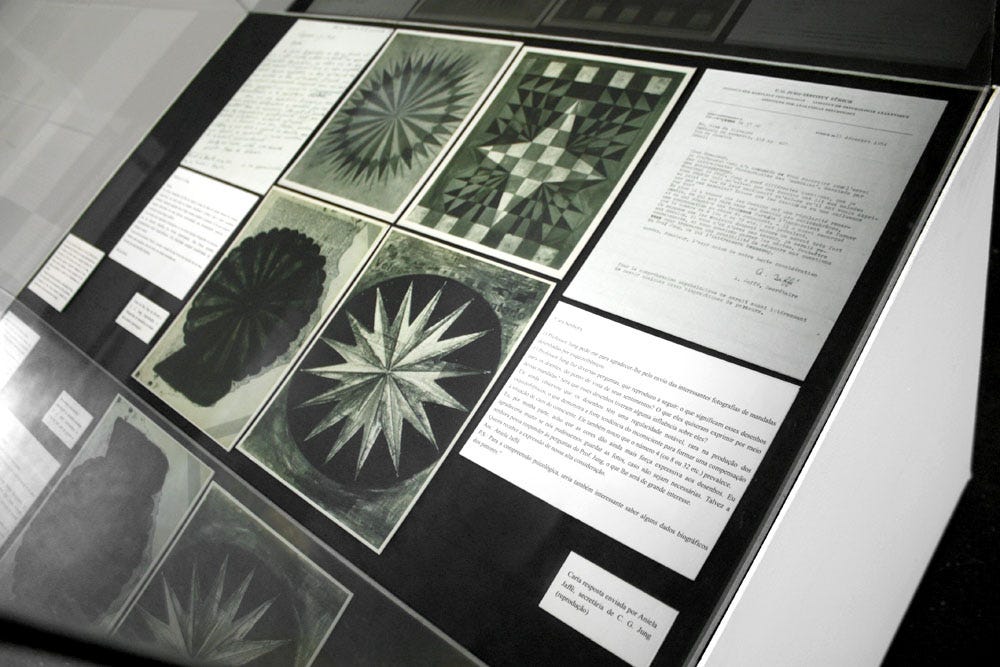
The Museum is open for visitors, artists and researchers. We were generously met by Christina Gabaglia Penna, the General Secretary of the Society of the Friends of the Museum of Unconscious Images, who shared rich insights into the Museum’s history and showed us the collections. We also sat with the Museum team in Dr. Nise’s personal library and had a fascinating conversation about how the Museum keeps her legacy alive. We demarcated, as well, the ‘free clinics’ aspect of this pioneer of psychoanalytic work in the community.
Other ‘Outsider art’ museums attached to psychiatric hospitals, which may be of interest to readers, include the Museum dr Guislain in Ghent and the Prinzhorn Collection in Heidelberg.
Free-associative Interviews with Brazilian Psychoanalysts Discussing the Legacies of the Free Clinics
During this first field trip we focused on mapping the context of what can be understood as the Brazilian free clinics legacy. Noticing, along with our colleagues, the vibrancy of contemporary free clinics all across the country, we set out to ask analysts and scholars from different generations, orientations and practices about their memories, experiences and views of this contemporary phenomenon. We were able to meet with several people for psychosocial free-associative interviews.
One very special aspect of the pool of participants in this round of research was that we met people who had trained in psychoanalysis from the 1960s, all the way to the 2000s, which resulted in a fascinating multi-generational thread of what has held psychoanalysis alive in Brazil. We are planning a second trip in spring/summer 2024, and look forward to disseminating these fascinating insights and observations in due course.
Kwame Yonatan’s Book Launch. ‘Por Um Fio: Uma Escuta das Diásporas Pulsionais’, 2023, Calligraphie
While in Brazil we celebrated the release of our colleague and ally Kwame Yonatan Poli dos Santos’ book in Rio de Janeiro. Unlike usual psychoanalytic book launches, held at bookshops and academic conferences, Por Um Fio: Uma Escuta das Diásporas Pulsionais (By a Thread: Listening to the Diasporic Drives) was welcomed into the world at one of Rio’s most special venues, to the sound of music, dance, food, children’s play and chatter.
In the port region known as ‘Little Africa’, lined with intricate, albeit impoverished, buildings, we entered the stunning Museum of Afro-Brazilian History and Culture –MUHCAB. Situated around the corner from the Museum is the Instituto Pretos Novos (Institute of Research and New Black Memory), which was created in 2005 following the devastating discovery of a slave cemetery in 1996. Now an archaeological site, it was where the people kidnapped and displaced from Africa, who had passed away during the Atlantic crossing to Brazil, had been buried or, more precisely, dumped.
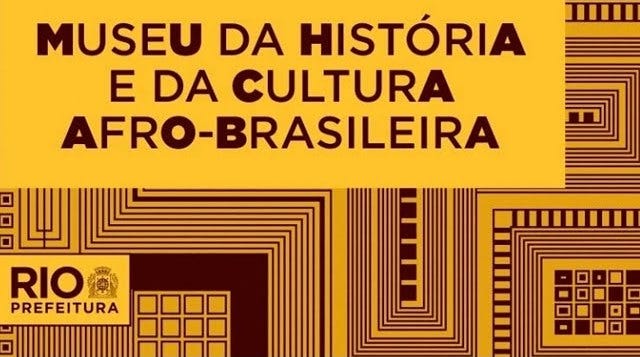
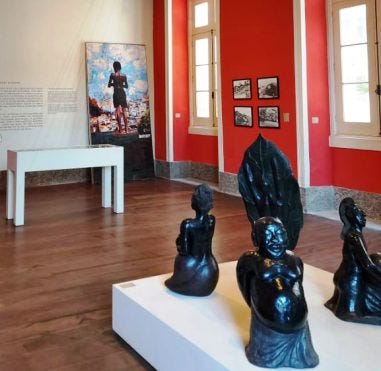
The museum was inaugurated only in 2017, along this World Heritage circuit, and aims at ‘telling the history of this region which has witnessed the largest landing of enslaved African people in the world, of the important landmarks of affirmation of Blackness in Brazil and of the development of Afro-Brazilian culture, as well as debating concepts that emanate from such narratives and the current situation of Black people in Brazil today’.
This affirmation is exactly what went on in a warm Saturday afternoon, extending into the evening, under the sound of a traditional ‘roda de Samba’. Heritage, culture, political truths and complexities converged when Kwame, along with guests Emiliano Camargo David and Raluca Soreanu, pulled out chairs and started talking about the unconscious, racism, psychoanalysis, violence and ‘aquilombamento’ on the patio outside.
Throughout the book, Kwame argues that the consideration of foreign, disparate, heterogeneous elements is constitutive of psychoanalysis. The book invites its readers to an experiment of hybridization of clinical bases and an expansion of theoretical references, through a transdisciplinary dialogue. It also invites the production of a clinical dispositif that interferes with the subjective effects of coloniality. Hearing an excerpt of the book, resonating with its ethical vibration, was a profound experience: there was an important moment of pausing and turning toward it, as those present entered its atmosphere.
An article by Kwame on THE CLINICAL SPACE AS A QUILOMBO, can be downloaded from Edinburgh University Press
The Afro Brasil Emanoel Araujo Museum may also be of interest to readers and is located in São Paulo.
BUDAPEST
Raluca Soreanu, Ana Tomcic, Lizaveta van Munsteren and Julianna Pusztai
In 1929 psychoanalyst Sándor Ferenczi founded a free clinic in Budapest, which brought together key figures in Hungarian psychoanalysis, such as Michael and Alice Bálint, Vilma Kovács and Imre Hermann. Budapest is a key research site because its psychoanalytic beginnings were marked by a uniquely robust and effervescent pluridisciplinarity. In the first two decades of the twentieth century, the exchanges of avant-garde intellectuals (writers, musicians, painters, psychoanalysts, medical doctors, lawyers, economists), organised in a number of journals (e.g. Gyógyászat, Nyugat, Huszadik Század), had the role of popularising psychoanalysis. The voices of psychoanalysts were also heard in the national press, as they were often consulted on a great variety of topics, from psychopathology to matters of everyday life. In this vibrant climate, the Budapest Clinic was established as an autonomous entity from the Hungarian Psychoanalytical Society and it brought crucial innovations, including a conversation on the importance of the countertransference of the psychoanalyst to their patient. This aspect of the project will investigate the ramifications of these early practices in our times.
Ferenczi150 Conference
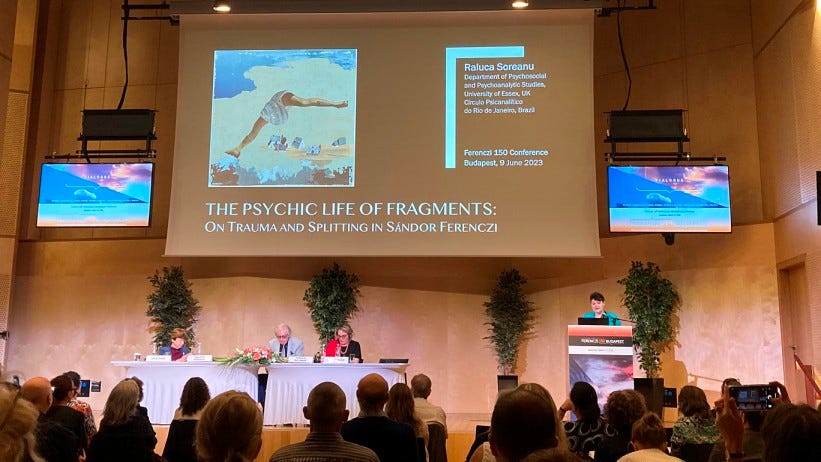
Between June 9th and 11th, our team attended the Ferenczi 150 Anniversary International Conference [https://ferenczisandor.hu/en/category/conference/], which was held in Budapest to mark the psychoanalyst’s 150th birthday. Organised by the Ferenczi Sándor Society in collaboration with the Hungarian Psychoanalytical Society and Free Association Lisbon, the conference aimed to make its mark in a community of scholars interested in Ferenczi’s work and to explore the wide-ranging relevance of Ferenczi’s therapeutic and theoretical approaches today. The Ferenczi150 conference was proof of how much the Ferenczi community has grown over the past two decades, with five panels taking place simultaneously throughout the first two days of the conference. The following ISFN conference will be held in São Paulo, May 29th – June 1st 2024.
Regarding the contemporary relevance of Ferenczi’s thought, we were introduced to its applications in work with refugees and immigrants, with traumatised children, in education, in the art world, in the psycho-social and cultural sphere, in linguistics, feminism and elsewhere. These different contexts provided a fertile ground for the exploration of some of Ferenczi’s central concepts and methods, such as that of the unwelcome child, of mutuality (including mutual analysis), psychic fragmentation, his theories of sexuality and the importance of the maternal. In addition, the attendees were given an extensive insight into the life, ideas and legacy of Ferenczi’s most famous analysand, Elizabeth Severn as well as Ferenczi’s influence on other analysts like Michael Bálint, Donald Winnicott and Heinz Kohut.
The FREEPSY team had a strong presence in the conference. Raluca Soreanu, the FREEPSY lead, gave one of the plenary talks of the conference, titled ‘The Psychic Life of Fragments: On Trauma and Splitting in Sándor Ferenczi’, focusing on the core innovations of Ferenczi’s trauma theory and on his clinical imaginary of fragments. A version of the talk will be published in chapter form in an edited volume following the conference, organised by Judit Mészaros and Tracy Simon, to be published by Routledge in 2024.
A further exciting event was the first conference presentation of our PhD candidate Julianna Pusztai. Beginning with a well-known contemporary narrative – the story of a wolf who, due to circumstances related to climate change, crossed nearly 2000 km only to be shot at the Hungarian-Slovakian border – the paper posed a number of relevant questions related to identification and the genesis of violence under social oppression. In an original fashion, these questions were related to Ferenczi’s ideas about law and psycho-social adaptation.
The conference gave rise to a number of interesting conversations and new contacts that will certainly result in a number of common projects and collaborations, which you will be able to read about in following issues!
Visit to the André Haynal Special Collection, Eötvös Loránd University
In June 2023, the FREEPSY team visited the André Haynal Special Collection, held by the library of the Eötvös Loránd University, Faculty of Education and Psychology. After his death in 2019, André Haynal’s personal library was donated to the university library. The team spent the day reading through this multilingual collection assembled over many decades: a labour of love of psychoanalysis.
André Haynal, born in 1930, was a prominent figure of the Ferenczi school, a psychoanalyst, psychiatrist, scholar, author, and teacher. In his library, we found classic psychoanalytic texts in Hungarian, German, French, and English, with surprising items like seminars by Lacan or rare political pieces like ‘Pavlov and Freud’ by H.K. Wells. Many more books on the history of psychoanalysis and texts by Hungarian psychologists and psychoanalysts from the mid-20th century helped our team’s researchers imagine the intellectual field that Haynal was part of. Overall, the items in the collection were important for the FREEPSY project as an archive of names and ideas that we will unpack individually in our research.
Visit to the Psychiatric Art Collection of the Hungarian Academy of Sciences, with Monika Perenyei
In June 2023, as one of the highlights of our fieldtrip to Budapest, we had the privilege to be shown the Psychiatric Art Collection (held at the Research Centre for the Humanities, Institute for Art History, in Budapest) by art historian and head of the Collection, Monika Perenyei.
Deeply immersed in this rich material, Monika Perenyei opened a whole new world for us, containing paintings, drawings, sculptures, photo albums, and the histories of their production. We pondered together on some radical threads of Hungarian psychiatry in the interwar period, and on some important connections with the Budapest School of Psychoanalysis.
Following this visit, Monika Perenyei and Raluca Soreanu have started a fruitful collaboration, and they experiment with thinking and writing together. At present, they are working on a paper tentatively called ‘The Dream Album: Angyalföldi múzeumalbuma and the Politics of Presentation of the Asylum in Interwar Budapest’, which looks at the conditions of possibility of an unusual photo album, the Angyalföldi múzeumalbuma, assembled in interwar Budapest, as a montage created around life in the asylum. The album is an interdisciplinary, multi-referential, multi-temporal creation, containing a heterogenous ensemble of elements that hold together in interesting relations.
Imágó Budapest Seminar
In June 2023, by invitation of Antal Bókay, professor of modern literature and literary theory, and founding member of the Hungarian Ferenczi Association and the Imago Society Budapest, the FREEPSY team ran a seminar at The Institute of Psychology, The Hungarian Academy of Sciences. The team was delighted to meet Anna Borgos, psychologist and women’s historian, and author of Women in the Budapest School: Girls of Tomorrow; Júlia Gyimesi, an associate professor in the Department of Personality and Clinical Psychology, Faculty of Humanities and Social Sciences, Pázmány Péter Catholic University; as well as their PhD students. They all generously commented on our team’s papers.
On this occasion, Ana Tomcic presented on ‘Melitta Schmideberg: The Unrecognised Pioneer of Psychoanalytic Offender Therapy’. Schmideberg is usually historically overlooked and mentioned only in the context of the ‘Controversial Discussions’ of the 1940s in the British Psychoanalytical Society, as the daughter of Melanie Klein and as an opponent of her mother’s views. Ana focused on the original theoretical contributions of Schmideberg’s work with offenders.
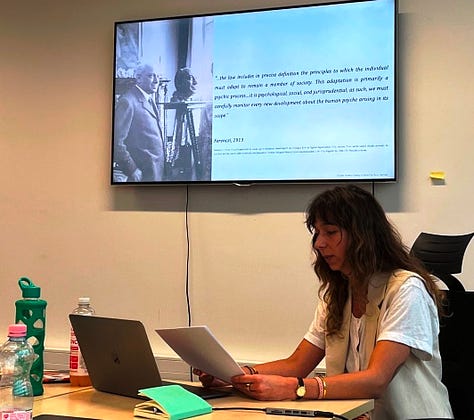
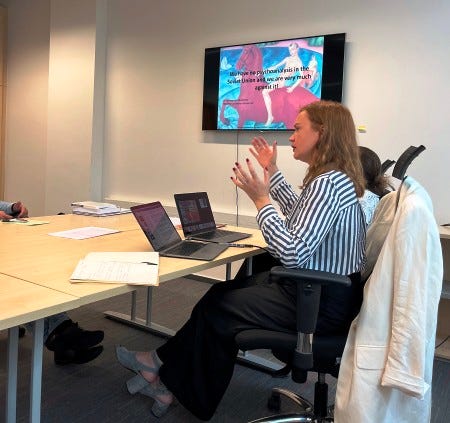
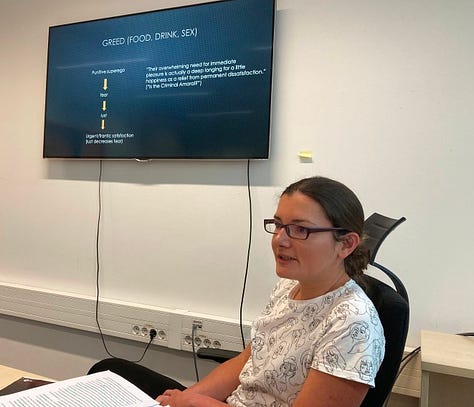
Lizaveta van Munsteren’s presentation ‘We Don't Like Psychoanalysis and We Are Very Much against It: The Vicissitudes of Psychoanalysis in Soviet Russia 1930-1980’ made the point of the flexibility of psychoanalytic theory and its capacity to produce insights in collaboration with other disciplines. Even though there was no institutional psychoanalysis in the Soviet Union during that period, various applications of psychoanalytic theory into practice were possible.
Julianna Pusztai, in her paper ‘Who Are We Becoming? A Psychosocial Reflection of Psyche and Power in the Contemporary Narrative of Psychoanalysis’ examined the social mission of psychoanalysis. She offered a reflection on Ferenczi’s ideas on a democratised psychoanalysis. In Hungarian, the work ‘Lélekelemzés’ means ‘soul-analysis’ rather than ‘psycho-analysis’, indicating the depth of interrelation of the mind with psychosocial factors: the history of a land, communal traumas, socio-political events.
Raluca Soreanu, in the paper ‘The Psychic Life of Fragments: Authority and the Superego’, discussed a vocabulary on asymmetry present in Ferenczi’s work, and its implications for understanding phenomena of submission to authority, but also the formation of the superego. Recapturing a largely forgotten debate of the 20s and 30s on a ‘pre-Oedipal’ superego, she theorised a ‘superego-as-a-scene’, the result of the introjection not of an object or of an aspect of an object, but of a scene.
After the seminar, the team spent the rest of the day together with Anna and Júlia, in a good tradition of Hungarian intellectual circles, in the café, sharing ideas and exchanging histories.
A visit with curator and art historian Kata Oltai
During our fieldwork, the Freepsy team spent an afternoon with the renowned Hungarian curator and art historian Kata Oltai at the FERi Gallery, a non-profit independent feminist exhibition venue in Budapest that she established in 2015 and directed for six years. During our time together, she graciously invited us to explore the gallery. She shared her dedication to expanding discussions on inclusive spaces in present-day Budapest's socio-political and cultural context, creating community spaces dedicated to bonding different social classes and multigenerational groups, where people come together and belong.
Oltai presented her ongoing projects, including the well-known boutique named Konfekció and the TANGÓ Project, a cultural initiative that delves into local history, visual representation, overlooked voices, and public spaces. We look forward to continuing our dialogue with Kata and expanding our collaboration in the future.
You can follow Kata’s work on Instagram @oltaikata @konfekcio @tango_projekt
The Ferenczi House Budapest, with Mónika Takács
During one of our last days in Hungary, we were warmly received at the Ferenczi House Budapest by Mónika Takács, a literary historian and the editor of the 'Art and Psychoanalysis' lecture series, a collaborative effort of the Sándor Ferenczi Association, the Attila József Society, and the Petőfi Literary Museum. She guided us through the garden decorated with red roses, representing the original roses gifted by Ernest Jones to Ferenczi.
Entering the Ferenczi House, Mónika walked us through the timeline of the villa, showcasing the original floorplan, Ferenczi's design, and how the home is structured in the present day. Based in Budapest's elegant Naphegy ('sun hill') district, the villa became Ferenczi's haven, where he spent his final years and produced some of his most significant writings.
Visiting the villa, once Ferenczi's residence and now a space for Ferenczian thought in our time, was a remarkable privilege as the culmination of our journey. It allowed us to trace Ferenczi's footsteps throughout the city, creating an embodied experience. The Ferenczi House stands as a container of memories, collections, donated items, and archives, holding profound significance for all of us.
For further information about the Sándor Ferenczi Society and the Ferenczi House, you can visit their website: https://ferenczisandor.hu/en/ferenczi-house/
EVENTS
The Sándor Ferenczi Collective
We would like to extend an invitation to the public for the first SÁNDOR FERENCZI COLLECTIVE meeting, an inclusive forum for Ferenczian thinking. The event is scheduled for 2:30 pm on February 10, 2024, at MayDay Rooms in London. Stay connected with SFC on Instagram @ferenczicollective, or register by following the following link: https://www.eventbrite.com/e/sandor-ferenczi-collective-meeting-tickets-793398816217?aff=erellivmlt
FREEPSY: Free Clinics Working Group
Ana Minozzo
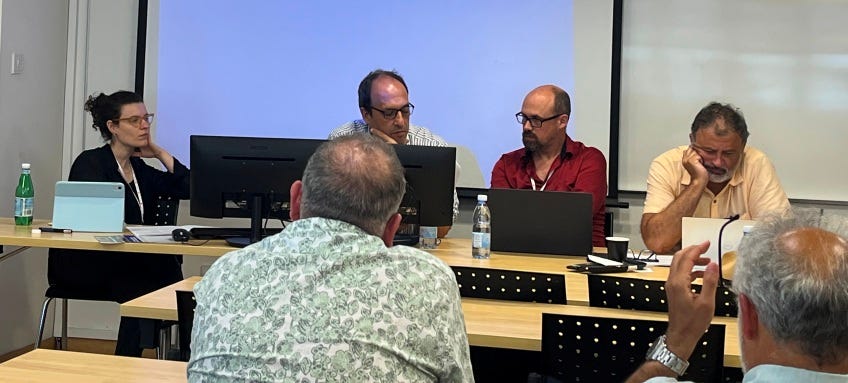
The Free Clinics Working Group is a collective space of exchange, learning, thinking and writing promoted by FREEPSY, University of Essex, UK. Over a series of meetings across the years of our research project, we will host guests from free clinics and scholars from various territories aiming at stretching our collective repertoire of what free psychoanalytic clinics are, can be, and how they operate across different contexts.
Over the next four years, 2024-2027, the FCWG will foster the establishment of an intimate network of researchers & clinicians of psychosocial orientation that can discuss texts, think-together and produce alternative types of scholarly work collectively, such as zines, online dictionaries, artwork and essays.
As an important part of FREEPSY research – ‘Free Clinics and a Psychoanalysis for the People: Progressive Histories, Collective Practices, Implications for our Times’ – the FCWG holds space for inscribing historical and contemporary accounts of free clinics into our fields of psychoanalysis and psychosocial studies. Sharing, reading, connecting and writing, we challenge the hegemonic historiography of our disciplines which sees psychoanalysis as a Eurocentric canon. We invest in the vibrancy of praxes that are either from the Global South or peripheric in their own manner, re-inventing psychoanalysis in their own time. This is a space where we can also expand our project’s research sites (North and South America, Central Europe and UK), being able to hear from colleagues and initiatives in Asia, Africa and the Middle East. Another important element of the FCWG is that it encourages a dialogue between clinicians and academics, inviting colleagues from the university into the world of day-to-day clinical practice as well as providing analysts a space for intellectual exchange and production.
FCWG meetings will be regular, hybrid and open to our participants and collaborators.
PUBLICATIONS
Translation of Work by István Hollós, 'Búcsúm a sárga háztól' (1927)
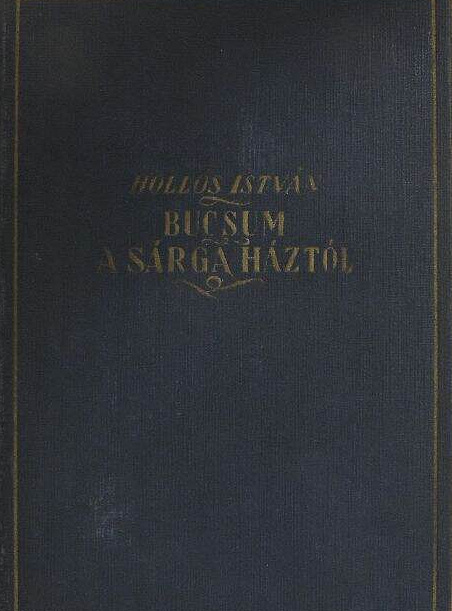
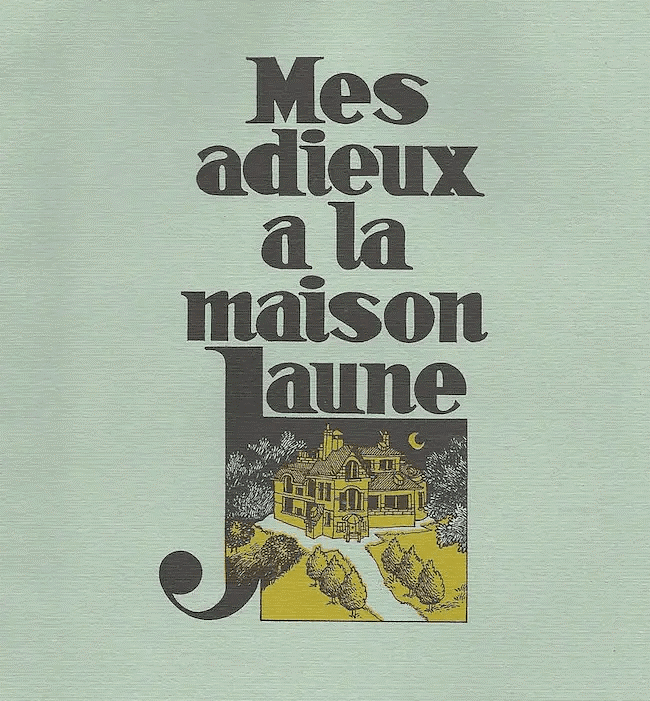
We are delighted to announce that we are working on the publication of an important book by István Hollós (1872-1957), psychoanalyst and psychiatrist, and part of the Budapest School of Psychoanalysis. The book is titled Búcsúm a sárga háztól, and it was published by Genius (Budapest) in 1927. The title can be translated into English as My Farewell to the Yellow House. Hollós was an unusual and creative figure, and he produced this fascinating book, which counts as an anti-psychiatry intervention, based on his experience as a director of one of the Budapest asylums, Lipótmezõ. We would like this to be an event-book, and start a conversation about lesser-known anti-psychiatry movements.
The book has been translated to German, Italian, and French (the latter by Judith Dupont, in a limited circulation, associated to the journal Coq-Héron, with the title Mes Adieux de la Maison Jaune).
We have the privilege to work with translator Adrian Courage, who will finalise the translation early 2024.
The Free Clinics Network
The Free Clinics Network brings together clinical institutions and practitioners around the world involved in offering free or low-cost psychoanalysis. The Free Clinics Network is relevant to both patients and psychoanalysts globally, aiming to promote shared practices among the clinicians and to widen access to psychoanalytic treatment.
In the Free Clinics Network, and in the context of the project FREEPSY, patients are regarded as co-creators of a context of care, and not ‘service users’. Psychoanalytic and other mental health practitioners are refigured as contributors to collective action and collective creativity, not ‘mental health providers’.
If you are an analyst working for an organisation providing free or low-cost psychoanalysis, please consider filling in the form below and become part of the network. Please share this information as widely as possible with your colleagues, patients and anyone else who might be interested.
Please fill in the Free Clinics Form to become a part of our Network: https://forms.gle/EssvPc9x8HGYSm9R8
But wait: a psychoanalysis for the people? For whom else would it be, or to whom else would it possibly belong? Why was psychoanalysis invented if not to care for the speaking subject, each speaking subject, in their fragile existence between the singularity of a lived experience and the universality of our being? Chris Chamberlin, FreePsy launch
Thank you for reading!




